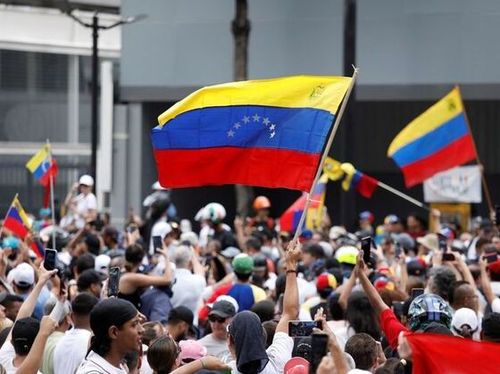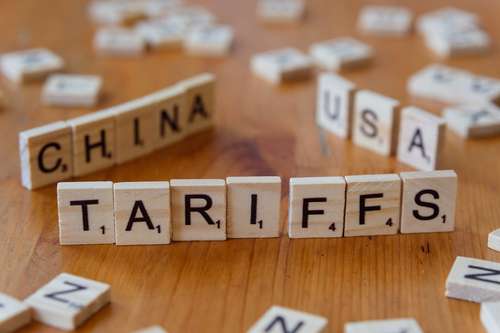In recent months, economic hardships have resulted in protests across several nations.
Citizens in these countries are involved in clashes with security forces, and demand the governments to address the economic and social challenges faced by their populations.
The protests are of various decrees and nature but share a common thread of citizens demanding better governance and relief from economic pressures.
All that being said, here’s a closer look at seven countries in protest.
Kenya

Protests in Kenya | R. Bociaga / Shutterstock.com
Kenya is experiencing a wave of protests triggered by proposed tax hikes.
The movement, which started on June 18, has expanded to demand more accountable governance. Initial protests were peaceful, but violence erupted on June 25.
President William Ruto, after initially dismissing the protests, shelved the contentious Finance Bill 2024.
Despite this, demonstrations continued, with citizens showing grievances about government accountability and economic hardship.
Protesters organized a national vigil to honor those killed by the police.
The movement criticizes the luxury in which officials live while imposing austerity measures on the public.
President Ruto has faced criticism for using live fire against protesters and for failing to engage in meaningful dialogue with the youth.
Furthermore, Kenya’s economic situation, with a high national debt and heavy reliance on revenue to service it, fueled the hunger protests. The administration’s cuts to subsidies and tax increases aroused the public’s frustration.
Bangladesh

Bangladesh protests | Mamunur Rashid / Shutterstock
Bangladesh has seen student-led protests against civil service job quotas.
The unrest, which started last month over employment opportunities, led to days of violence, resulting in over 200 deaths.
The government’s response included deploying troops, imposing a curfew, and shutting down the internet.
Despite the crackdown, students continued to demand the release of their leaders and an apology for those killed.
The government's perceived insensitivity and use of quotas to favor loyalists have fueled the unrest.
The protests had remained largely peaceful until police and pro-government groups attacked demonstrators.
Kenya's government accused opposition parties of hijacking the protests to cause unrest.
With around 18 million young people out of work, the economic hardship has driven these hunger protests.
The students’ demands for fair employment practices and an end to job quotas resonate with a broader call for change in governance. The violent response from the government has only intensified the protesters’ resolve.
Pakistan

Protests in Pakistan | Asianet-Pakistan / Shutterstock.com
In Pakistan, supporters of the Jamaat-e-Islami Pakistan party have staged a sit-in in Rawalpindi.
The protest was prompted by an increase in electricity costs, which many citizens find unaffordable.
The party’s leader, Naeem-ur-Rehman, called for the sit-in to pressure the government to withdraw the price hike. Authorities detained numerous supporters to prevent the rally in Islamabad, citing security concerns.
The protests showed dissatisfaction with the economic policies, particularly the conditions set by the International Monetary Fund (IMF) for a new loan deal.
People complain that electricity bills are higher than their salaries. The government’s attempts to quell the protests through arrests and detentions have only fueled the public’s anger.
Venezuela

Protesters in Venezuela after the controversial election | USNews.com
Security forces in Venezuela have fired tear gas and rubber bullets at people protesting Sunday’s disputed election result.
Thousands of people descended on central Caracas on Monday evening, some walking for miles from slums on the mountains surrounding the city, towards the presidential palace.
Protests erupted in the Venezuelan capital the day after President Nicolás Maduro claimed victory.
The opposition has disputed Mr. Maduro's declaration as fraudulent, saying that after reviewing 73.2% of the voting tallies, it was clear that its candidate, Edmundo González, had won convincingly.
Opinion polls ahead of the election suggested a clear victory for the challenger.
Opposition parties had united behind Mr. González in an attempt to unseat President Maduro after 11 years in power, amid discontent over the country's economic crisis.
A heavy military and police presence was on the streets of Caracas to try to disperse protesters and prevent them from approaching the presidential palace.
Crowds of people chanted “freedom, freedom!” and called for the government to fall.
Footage showed tires burning on highways and large numbers of people on the streets, with police on motorbikes firing tear gas.
The Venezuelan attorney general warned that the blocking of roads or breaking any laws related to disturbances as part of protests would be met with the full force of the law.
He added that 32 people had been detained on accusations ranging from destroying electoral materials to sparking acts of violence.
Several Western and Latin American countries, as well as international bodies including the UN, have called on the Venezuelan authorities to release voting records from individual polling stations.
Uganda

Protesters in Uganda | Ericky Boniphace / Shutterstock.com
Ugandan security forces arrested dozens of people attempting to protest against high-level corruption.
The protests, inspired by similar actions in Kenya, were deemed illegal by authorities.
Police and military forces were heavily deployed in Kampala to prevent the demonstrations.
Protesters demanded accountability from corrupt officials, including the parliament speaker, Anita Among, who faces corruption allegations.
President Yoweri Museveni’s government has a long history of using force to suppress dissent.
The protest has led to a series of arrests and battery of some of the protest spearheads.
Despite the crackdown, the resolve of the protesters remains strong, driven by economic hardships and a desire for clean governance.
Nigeria

Protests in Nigeria | vic josh / Shutterstock
Nigeria is faced with nationwide protests over the rising cost of living.
The demonstrations, expected to last ten days, have seen security forces tighten their presence in Lagos and Abuja.
President Bola Ahmed Tinubu's economic reforms, aimed at reviving the economy, have led to soaring inflation and a devalued currency.
Protesters, using the hashtag #EndBadGovernanceinNigeria, demand action against food inflation and fuel prices that have tripled.
The government has responded with tear gas and roadblocks to contain the unrest.
France

Protests in France | Victor Velter / Shutterstock.
France is witnessing violent clashes following a shock win for the left-wing New Popular Front in the snap general election.
Protesters have launched flares, set e-bikes on fire, and clashed with police across the country.
The election results have blocked the far-right National Rally from taking power, leading to public unrest.
President Emmanuel Macron faces a hostile parliament, with the New Popular Front and other parties vowing to challenge his policies.
Conclusion
As protests continue in seven countries, the situation shows the serious social and economic problems many nations face. Governments need to listen and address the reasons behind these hunger protests to bring back peace and stability.
These protests show a strong desire for better governance and economic fairness. The protestors' voices, united in action, call for change and justice around the world.




